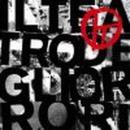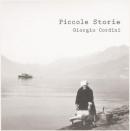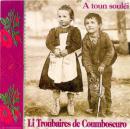Tu prova ad avere un mondo nel cuore
e non riesci ad esprimerlo con le parole,
e la luce del giorno si divide la piazza
tra un villaggio che ride e te, lo scemo, che passa,
e neppure la notte ti lascia da solo:
gli altri sognan se stessi e tu sogni di loro
E sì, anche tu andresti a cercare
le parole sicure per farti ascoltare:
per stupire mezz'ora basta un libro di storia,
io cercai di imparare la Treccani a memoria,
e dopo maiale, Majakowsky, malfatto,
continuarono gli altri fino a leggermi matto.
E senza sapere a chi dovessi la vita
in un manicomio io l'ho restituita:
qui sulla collina dormo malvolentieri
eppure c'è luce ormai nei miei pensieri,
qui nella penombra ora invento parole
ma rimpiango una luce, la luce del sole.
Le mie ossa regalano ancora alla vita:
le regalano ancora erba fiorita.
Ma la vita è rimasta nelle voci in sordina
di chi ha perso lo scemo e lo piange in collina;
di chi ancora bisbiglia con la stessa ironia
"Una morte pietosa lo strappò alla pazzia".
e non riesci ad esprimerlo con le parole,
e la luce del giorno si divide la piazza
tra un villaggio che ride e te, lo scemo, che passa,
e neppure la notte ti lascia da solo:
gli altri sognan se stessi e tu sogni di loro
E sì, anche tu andresti a cercare
le parole sicure per farti ascoltare:
per stupire mezz'ora basta un libro di storia,
io cercai di imparare la Treccani a memoria,
e dopo maiale, Majakowsky, malfatto,
continuarono gli altri fino a leggermi matto.
E senza sapere a chi dovessi la vita
in un manicomio io l'ho restituita:
qui sulla collina dormo malvolentieri
eppure c'è luce ormai nei miei pensieri,
qui nella penombra ora invento parole
ma rimpiango una luce, la luce del sole.
Le mie ossa regalano ancora alla vita:
le regalano ancora erba fiorita.
Ma la vita è rimasta nelle voci in sordina
di chi ha perso lo scemo e lo piange in collina;
di chi ancora bisbiglia con la stessa ironia
"Una morte pietosa lo strappò alla pazzia".
inviata da Marco Valdo M.I. - 2/1/2009 - 21:16
Lingua: Inglese
La versione inglese di Dennis Criteser [2014]
Dal blog Fabrizio De André in English
Dal blog Fabrizio De André in English
Non al denaro non all'amore nè al cielo, released in 1971, is a concept album inspired by poems from The Spoon River Anthology by Edgar Lee Masters, published in 1915 and translated into Italian in 1943 by Fernanda Pivano (below, with De André). Each poem tells the story, as an epitaph, of one of the denizens of the fictional small town Spoon River. De André read and liked the book when he was 18, and when he re-read it years later was again struck by the relevance of the stories and the lives therein. He wanted to show, with the nine poems he chose, some aspects of life related to envy, love and the failure of science. The album was an immediate success upon its release. - Dennis Criteser
A MADMAN
[Behind Every Fool there's a Village]
You try to have a world in your heart
and can’t manage to express it with words,
and the light of day separates the plaza
into a laughing village and you, the fool, who passes.
And not even the night leaves you alone:
the others dream of themselves and you dream of them.
And yes, even you would go to search
for the words certain to make them listen to you:
to amaze for a half hour, a book of history is enough.
I tried to learn the Encyclopedia Treccani by heart,
and after 'pig,' 'Majakowsky,' 'messy,'
the others continued on until they read me 'crazy.'
And without knowing to whom I owed my life,
to a madhouse I returned it:
here on the hill I sleep unwillingly.
yet by now there is light in my thoughts.
Here in the semi-darkness, now I invent words,
though I miss a light, the light of the sun.
My bones are still giving to life:
they’re still giving it flowery grass.
But life remained in the voices on the sly
of those who lost the fool and mourn for him in the hill,
of those who still whisper with the same irony,
“A merciful death tore him out of craziness.”
[Behind Every Fool there's a Village]
You try to have a world in your heart
and can’t manage to express it with words,
and the light of day separates the plaza
into a laughing village and you, the fool, who passes.
And not even the night leaves you alone:
the others dream of themselves and you dream of them.
And yes, even you would go to search
for the words certain to make them listen to you:
to amaze for a half hour, a book of history is enough.
I tried to learn the Encyclopedia Treccani by heart,
and after 'pig,' 'Majakowsky,' 'messy,'
the others continued on until they read me 'crazy.'
And without knowing to whom I owed my life,
to a madhouse I returned it:
here on the hill I sleep unwillingly.
yet by now there is light in my thoughts.
Here in the semi-darkness, now I invent words,
though I miss a light, the light of the sun.
My bones are still giving to life:
they’re still giving it flowery grass.
But life remained in the voices on the sly
of those who lost the fool and mourn for him in the hill,
of those who still whisper with the same irony,
“A merciful death tore him out of craziness.”
inviata da Riccardo Venturi - 29/2/2016 - 08:56
Lingua: Inglese
There's a world you carry around in your chest
you try to describe it, it's hard to express
the clear light of day splits the plaza into
the village that's mocking and a fool it is you
and not even the nighttime stop you from dreaming
they dream of themselves out of they're the fools dreaming
Searching for words I hope can impress
for the words that will startle the words with finesse
to hold their attention I've learned a book for a start
to try to lure the the pediatric candy by a heart
after like within Laughlin and lawyer and a lazy
the others continue until they found me crazy
And now I don't know where my life came from
so what difference if I give it to an asylum
on a hill I can sleep when they put the pills in me
here in the twirl they do not fill me
in here in the twilight now I invent words
although I miss the light and the curve of the earth
And though I've gone there's still life in my bones
to the flower and grass the grow around these stones
and life is remembered in the voices of those
who mourn for the fool in his last repose
of those he'll still whisper this under their breath
his insanity cure by merciful dad
you try to describe it, it's hard to express
the clear light of day splits the plaza into
the village that's mocking and a fool it is you
and not even the nighttime stop you from dreaming
they dream of themselves out of they're the fools dreaming
Searching for words I hope can impress
for the words that will startle the words with finesse
to hold their attention I've learned a book for a start
to try to lure the the pediatric candy by a heart
after like within Laughlin and lawyer and a lazy
the others continue until they found me crazy
And now I don't know where my life came from
so what difference if I give it to an asylum
on a hill I can sleep when they put the pills in me
here in the twirl they do not fill me
in here in the twilight now I invent words
although I miss the light and the curve of the earth
And though I've gone there's still life in my bones
to the flower and grass the grow around these stones
and life is remembered in the voices of those
who mourn for the fool in his last repose
of those he'll still whisper this under their breath
his insanity cure by merciful dad
inviata da Dq82 - 6/6/2021 - 12:49
Lingua: Francese
Version française – Un fou – Marco Valdo M.I. – 2008
J'avais traduit l'autre jour, la « Storia d'un cane », l' « Histoire d'un Chien », d'Ivan Della Mea, qui m'avait remué dans les profondeurs.
Avec « Un Matto », « Un Fou », Fabrizio De André touche pareillement aux plus profonds du cœur et de l'humain qui vit en moi.
Reste que j'avais aussi traduit " Il Matto " de Francesco Guccini et que dans le commentaire, je faisais référence à celui de Fabrizio De André. Deux chansons fabuleuses ! Elles me paraissent devoir figurer ensemble sur un même site....
Parmi tous les rejetés, parmi tous ceux qui comme les braccianti de Carlo Levi qui disaient : « Noi, non siamo cristiani, siamo somari » (les paysans de Carlo Levi, les amis de Carlo Levi qui disaient : « Nous nous ne sommes pas des chrétiens (des hommes), nous sommes des bêtes de somme ») sont mis à l'écart de l'humaine nation, les handicapés physiques et/ou mentaux n'avaient même pas place parmi ces triangles qui couvrent encore de honte le Reich: on ne les envoyait pas dans les camps, ils étaient stérilisés de force ou on les tuait sur place, où qu'on les trouve ou alors, on les empoisonnait, on les laissait mourir... de faim.
Et depuis, comme dit Fabrizio De André : leurs «os donnent encore de la vie: ils donnent encore de l'herbe fleurie. »
L'idiot a sa grande dignité, il doit être défendu toujours et partout car c'est l'un d'entre nous, parmi les plus faibles d'entre nous. Il doit être protégé et porté par nous car il est le signe de la solidarité, hors de laquelle pas d'humanité.
Peut-être une façon d'interpréter le titre de l'album d'où est extraite cette chanson et qui est « Dietro Ogni Scemo C'è Un Villaggio », « Derrière chaque idiot, il y a un village », est de bien voir que nous faisons tous partie de ce village global de notre planète.
Car aussi, frères humains, ce « matto », ce « pazzo », ce « fou », cet « idiot », ce « dingue », ç'aurait pu être toi. D'ailleurs, ce le sera peut-être demain: maladie, accident... Ou ton enfant? Qui sait?
En tout cas, c'est un de mes enfants!
Ainsi parlait Marco Valdo M.I.
Avec « Un Matto », « Un Fou », Fabrizio De André touche pareillement aux plus profonds du cœur et de l'humain qui vit en moi.
Reste que j'avais aussi traduit " Il Matto " de Francesco Guccini et que dans le commentaire, je faisais référence à celui de Fabrizio De André. Deux chansons fabuleuses ! Elles me paraissent devoir figurer ensemble sur un même site....
Parmi tous les rejetés, parmi tous ceux qui comme les braccianti de Carlo Levi qui disaient : « Noi, non siamo cristiani, siamo somari » (les paysans de Carlo Levi, les amis de Carlo Levi qui disaient : « Nous nous ne sommes pas des chrétiens (des hommes), nous sommes des bêtes de somme ») sont mis à l'écart de l'humaine nation, les handicapés physiques et/ou mentaux n'avaient même pas place parmi ces triangles qui couvrent encore de honte le Reich: on ne les envoyait pas dans les camps, ils étaient stérilisés de force ou on les tuait sur place, où qu'on les trouve ou alors, on les empoisonnait, on les laissait mourir... de faim.
Et depuis, comme dit Fabrizio De André : leurs «os donnent encore de la vie: ils donnent encore de l'herbe fleurie. »
L'idiot a sa grande dignité, il doit être défendu toujours et partout car c'est l'un d'entre nous, parmi les plus faibles d'entre nous. Il doit être protégé et porté par nous car il est le signe de la solidarité, hors de laquelle pas d'humanité.
Peut-être une façon d'interpréter le titre de l'album d'où est extraite cette chanson et qui est « Dietro Ogni Scemo C'è Un Villaggio », « Derrière chaque idiot, il y a un village », est de bien voir que nous faisons tous partie de ce village global de notre planète.
Car aussi, frères humains, ce « matto », ce « pazzo », ce « fou », cet « idiot », ce « dingue », ç'aurait pu être toi. D'ailleurs, ce le sera peut-être demain: maladie, accident... Ou ton enfant? Qui sait?
En tout cas, c'est un de mes enfants!
Ainsi parlait Marco Valdo M.I.
UN FOU
Tu ressens un monde dans ton cœur,
Mais tu n'arrives pas à l'exprimer avec des mots,
la lumière du jour divise la place
entre un village qui rit et toi, l'idiot, qui passe,
et même la nuit te laisse seul :
les autres songent à eux et toi tu rêves d'eux.
Et si, même irais-tu chercher
des mots certains pour te faire écouter;
pour étonner une demi-heure, un livre d'histoire suffit,
je cherchai à apprendre la Treccani [1] par cœur,
et après porc, Maïakowski, mal foutu,
les autres continueront jusqu'à ce qu'ils me lisent fou.
Et sans savoir à qui tu devais la vie
dans un asile, je te l'ai restituée;
ici, sur la colline, je dors difficilement
et cependant, il y a désormais de la clarté dans mes pensées,
Ici dans la pénombre j'invente des mots
Mais je regrette une lumière, la lumière du soleil.
Mes os donnent encore de la vie :
ils donnent encore de l'herbe fleurie.
Mais la vie est restée dans les voix en sourdine
de ceux qui ont perdu l'idiot et le pleurent sur la colline,
de ceux qui murmurent encore avec la même ironie
« Une mort pieuse l'arracha à la folie ».
Tu ressens un monde dans ton cœur,
Mais tu n'arrives pas à l'exprimer avec des mots,
la lumière du jour divise la place
entre un village qui rit et toi, l'idiot, qui passe,
et même la nuit te laisse seul :
les autres songent à eux et toi tu rêves d'eux.
Et si, même irais-tu chercher
des mots certains pour te faire écouter;
pour étonner une demi-heure, un livre d'histoire suffit,
je cherchai à apprendre la Treccani [1] par cœur,
et après porc, Maïakowski, mal foutu,
les autres continueront jusqu'à ce qu'ils me lisent fou.
Et sans savoir à qui tu devais la vie
dans un asile, je te l'ai restituée;
ici, sur la colline, je dors difficilement
et cependant, il y a désormais de la clarté dans mes pensées,
Ici dans la pénombre j'invente des mots
Mais je regrette une lumière, la lumière du soleil.
Mes os donnent encore de la vie :
ils donnent encore de l'herbe fleurie.
Mais la vie est restée dans les voix en sourdine
de ceux qui ont perdu l'idiot et le pleurent sur la colline,
de ceux qui murmurent encore avec la même ironie
« Une mort pieuse l'arracha à la folie ».
[1] Treccani : nom d'une encyclopédie italienne qui souffre encore d'avoir été créée et portée par le régime fasciste; au point que son fondateur, Treccani degli Alfieri, Giovanni. - Industriel et mécène (Montichiari 1877 - Milano 1961), sénateur del Regno en 1924 et fondateur, il 18 febbraio 1925, dell'Istituto Giovanni Treccani per la pubblicazione della Enciclopedia Italiana e del Dizionario Biografico degli Italiani, fut élevé à la « dignité » de Comte en 1937, in tempore suspecto. L'Enciclopedia Italiana di scienze, lettere ed arti est toujours présente et n'a pas pris la peine de changer de nom.
inviata da Marco Valdo M.I. - 2/1/2009 - 21:22
Lingua: Finlandese
Traduzione finlandese della canzone di Fabrizio De André / Finnish translation of Fabrizio De André's song / Traduction finnoise de la chanson de Fabrizio De André / Fabrizio De Andrén laulun suomennos: Juha Rämö
MIELIPUOLI
[Jokaisen hullun takana on kylä]
Yrität rakentaa sydämeesi maailman
etkä pysty pukemaan sitä sanoiksi,
ja päivänvalo jakaa toriaukion kahtia,
toisella puolella naurava kylä, toisella sinä, ohikulkeva hullu.
Eikä edes yö jätä sinua rauhaan:
muut näkevät unia itsestään, sinä heistä.
Ja toki sinäkin rupeaisit etsimään
sanoja, joita muut eivät voisi olla kuulematta:
satukirjassakin riittäisi hämmästeltävää puoleksi tunniksi.
Yritin opetella ensyklopedian ulkoa,
ja »maisterin«, »Majakovskin« ja »metronomin« jälkeen
muut jatkoivat ja löysivät minut kohdasta »mielipuoli«.
Ja tietämättä, kenelle olin elämäni velkaa,
vein sen takaisin hullujenhuoneelle.
Täällä, kummun alla, lepään tahtomattani,
vaikka ajatuksiini on tullutkin valoa.
Täällä, puolihämärässä, keksin nyt sanoja,
vaikka kaipaankin valoa, auringon valoa.
Luuni antavat vieläkin voimaa elämälle,
ne antavat vieläkin voimaa kukkivalle nurmelle.
Mutta elämä sammui niiden tukadutettuihin ääniin,
jotka mielipuoli jätti suremaan kumpunsa ääreen
ja jotka edelleen kuiskivat samoja ironisia sanoja:
»Armelias kuolema riisti hänet hulluuden kourista.«
[Jokaisen hullun takana on kylä]
Yrität rakentaa sydämeesi maailman
etkä pysty pukemaan sitä sanoiksi,
ja päivänvalo jakaa toriaukion kahtia,
toisella puolella naurava kylä, toisella sinä, ohikulkeva hullu.
Eikä edes yö jätä sinua rauhaan:
muut näkevät unia itsestään, sinä heistä.
Ja toki sinäkin rupeaisit etsimään
sanoja, joita muut eivät voisi olla kuulematta:
satukirjassakin riittäisi hämmästeltävää puoleksi tunniksi.
Yritin opetella ensyklopedian ulkoa,
ja »maisterin«, »Majakovskin« ja »metronomin« jälkeen
muut jatkoivat ja löysivät minut kohdasta »mielipuoli«.
Ja tietämättä, kenelle olin elämäni velkaa,
vein sen takaisin hullujenhuoneelle.
Täällä, kummun alla, lepään tahtomattani,
vaikka ajatuksiini on tullutkin valoa.
Täällä, puolihämärässä, keksin nyt sanoja,
vaikka kaipaankin valoa, auringon valoa.
Luuni antavat vieläkin voimaa elämälle,
ne antavat vieläkin voimaa kukkivalle nurmelle.
Mutta elämä sammui niiden tukadutettuihin ääniin,
jotka mielipuoli jätti suremaan kumpunsa ääreen
ja jotka edelleen kuiskivat samoja ironisia sanoja:
»Armelias kuolema riisti hänet hulluuden kourista.«
inviata da Juha Rämö - 4/6/2019 - 18:11
Lingua: Esperanto
Esperantigis Renato Corsetti, kantis Gianfranco Molle, el tiu ĉi retejo
Versione in esperanto di Renato Corsetti, eseguita da Gianfranco Molle
Versione in esperanto di Renato Corsetti, eseguita da Gianfranco Molle
LA STULTULO
Vi provu posedi en vi tutan mondon
sen eblo rakonti pri ĝi al la rondo
kaj lumo dumtaga dividas la placon
vilaĝo ridanta, stultulo sen paco
kaj eĉ nokte vi ne povas trankvili
ili sonĝas pri si, kaj vi sonĝas pri ili.
Jes, ankaŭ vi serĉus la vortojn tre glatajn
se ili nur estus ja nur aŭskultataj
por brili sufiĉas parkeri folion
mi provis la tutan enciklopedion
kaj post framasono, frizisto kaj fezo
aperis nur unu kap-vorto: frenezo.
La vivo min ĝenis kaj eĉ embarasis
ĝis mi en psiĥejo trankvile forpasis
mi dormas neĝoje kun tuta la aro
sed fine en kapo ĉe mi estas klaro
da vortoj mi trovis nun tutan volumon
mi tamen bedaŭras de l’ suno la lumon.
Kaj mi pludonacas per sama fervoro
el karno nun kreskas kaj herbo kaj floro
sed vivo nur restas en preĝaj formuloj
de homoj plorantaj pro siaj stultuloj
dirantaj plu moke per ega sintezo
pro morto li fuĝis el sia frenezo.
Vi provu posedi en vi tutan mondon
sen eblo rakonti pri ĝi al la rondo
kaj lumo dumtaga dividas la placon
vilaĝo ridanta, stultulo sen paco
kaj eĉ nokte vi ne povas trankvili
ili sonĝas pri si, kaj vi sonĝas pri ili.
Jes, ankaŭ vi serĉus la vortojn tre glatajn
se ili nur estus ja nur aŭskultataj
por brili sufiĉas parkeri folion
mi provis la tutan enciklopedion
kaj post framasono, frizisto kaj fezo
aperis nur unu kap-vorto: frenezo.
La vivo min ĝenis kaj eĉ embarasis
ĝis mi en psiĥejo trankvile forpasis
mi dormas neĝoje kun tuta la aro
sed fine en kapo ĉe mi estas klaro
da vortoj mi trovis nun tutan volumon
mi tamen bedaŭras de l’ suno la lumon.
Kaj mi pludonacas per sama fervoro
el karno nun kreskas kaj herbo kaj floro
sed vivo nur restas en preĝaj formuloj
de homoj plorantaj pro siaj stultuloj
dirantaj plu moke per ega sintezo
pro morto li fuĝis el sia frenezo.
inviata da Nicola Ruggiero - 7/3/2009 - 18:37
Lingua: Inglese
La poesia originale di Edgar Lee Masters dalla "Spoon River Anthology"
FRANK DRUMMER
Out of a cell into this darkened space--
The end at twenty-five!
My tongue could not speak what stirred within me,
And the village thought me a fool.
Yet at the start there was a clear vision,
A high and urgent purpose in my soul
Which drove me on trying to memorize
The Encyclopaedia Britannica!
Out of a cell into this darkened space--
The end at twenty-five!
My tongue could not speak what stirred within me,
And the village thought me a fool.
Yet at the start there was a clear vision,
A high and urgent purpose in my soul
Which drove me on trying to memorize
The Encyclopaedia Britannica!
Lingua: Italiano
La versione italiana di Fernanda Pivano della poesia di E.L. Masters
FRANK DRUMMER
Da una cella a questo luogo oscuro -
la morte a venticinque anni!
La mia lingua non poteva esprimere ciò che mi si agitava dentro,
e il villaggio mi prese per scemo.
Eppure all'inizio c'era una visione chiara,
un proposito alto e pressante, nella mia anima,
che mi spinse a cercar d'imparare a memoria
l'Enciclopedia Britannica!
Da una cella a questo luogo oscuro -
la morte a venticinque anni!
La mia lingua non poteva esprimere ciò che mi si agitava dentro,
e il villaggio mi prese per scemo.
Eppure all'inizio c'era una visione chiara,
un proposito alto e pressante, nella mia anima,
che mi spinse a cercar d'imparare a memoria
l'Enciclopedia Britannica!
Lingua: Francese
Version française du poème de Edgar Lee Masters.
Marco Valdo M.I. – 2010
Marco Valdo M.I. – 2010
FRANK DRUMMER
Sortie d'une cellule dans l'espace sombre
La fin à vingt-cinq !
Ma langue ne peut dire ce qui grouille au-dedans de moi
Et le village me pense fou.
Pourtant au début, il y avait une vision claire
Un but haut et pressant dans mon âme
Qui me poussa à chercher à mémoriser
L'Encyclopédie Britannique.
Sortie d'une cellule dans l'espace sombre
La fin à vingt-cinq !
Ma langue ne peut dire ce qui grouille au-dedans de moi
Et le village me pense fou.
Pourtant au début, il y avait une vision claire
Un but haut et pressant dans mon âme
Qui me poussa à chercher à mémoriser
L'Encyclopédie Britannique.
inviata da Marco Valdo M.I. - 24/10/2010 - 11:30
Lingua: Polacco
La traduzione polacca di Michał Sprusiński della poesia di Edgar Lee Masters
"Antologia Spoon River", Państwowy Instytut Wydawniczy, Warszawa 1981
"Antologia Spoon River", Państwowy Instytut Wydawniczy, Warszawa 1981
FRANK DRUMMER
Prosto z komórki w tę mroczniejącą przestrzeń –
zaledwie dwudziestopięcioletni!
Nie umiałem wysłowić, co kłębiło się we mnie,
i miasteczko obwołało mnie głupcem.
A przecież na początku miałem jasny zamiar,
szczytny i usilny zamysł duszy,
który nakazywał nauczyć się na pamięć
całej Encyclopedia Britannica!
Prosto z komórki w tę mroczniejącą przestrzeń –
zaledwie dwudziestopięcioletni!
Nie umiałem wysłowić, co kłębiło się we mnie,
i miasteczko obwołało mnie głupcem.
A przecież na początku miałem jasny zamiar,
szczytny i usilny zamysł duszy,
który nakazywał nauczyć się na pamięć
całej Encyclopedia Britannica!
inviata da Krzysiek Wrona - 15/3/2017 - 12:55
Lingua: Finlandese
Traduzione finlandese della poesia di Edgar Lee Masters / Finnish translation of Edgar Lee Masters's poem / Traduction finnoise du poème de Edgar Lee Masters / Edgar Lee Mastersin runon suomennos: Arvo Turtiainen
FRANK DRUMMER
Suoraan eräästä kopista tähän valottomaan tyhjyyteen –
vain kahdenkymmenenviiden ikäisenä.
Kieleni ei taipunut milloinkaan kertomaan
mitä sisimmässäni liikkui
ja kylä piti minua vähämielisenä.
Kuitenkin johti tietäni aluksi kirkas näkemys
hengelleni tarkoitetusta korkeasta ja tärkeästä tehtävästä
pakottaen minut ponnistelemaan oppiakseni ulkoa
Encyclopedia Britannican!
Suoraan eräästä kopista tähän valottomaan tyhjyyteen –
vain kahdenkymmenenviiden ikäisenä.
Kieleni ei taipunut milloinkaan kertomaan
mitä sisimmässäni liikkui
ja kylä piti minua vähämielisenä.
Kuitenkin johti tietäni aluksi kirkas näkemys
hengelleni tarkoitetusta korkeasta ja tärkeästä tehtävästä
pakottaen minut ponnistelemaan oppiakseni ulkoa
Encyclopedia Britannican!
inviata da Juha Rämö - 4/6/2019 - 18:09
Lingua: Svedese
Traduzione svedese della poesia di Edgar Lee Masters / Swedish translation of Edgar Lee Masters's poem / Traduction suédoise du poème d'Edgar Lee Masters / Svensk översättning av Edgar Lee Masters dikt / Edgar Lee Mastersin runon ruotsinkielinen käännös: Bertel Gripenberg
FRANK DRUMMER
Från en cell rakt i detta mörka rum -
och det vid bara tjugu år!
Min tunga kunde aldrig uttrycka vad som rörde inom mig
och staden ansåg mig vara en dåre.
Men i början hade jag ändå en klar blick
och min själ hyste en hög och ivrig strävan,
som drev mig till att försöka
att lära Encyclopedia Britannica utantill!
Från en cell rakt i detta mörka rum -
och det vid bara tjugu år!
Min tunga kunde aldrig uttrycka vad som rörde inom mig
och staden ansåg mig vara en dåre.
Men i början hade jag ändå en klar blick
och min själ hyste en hög och ivrig strävan,
som drev mig till att försöka
att lära Encyclopedia Britannica utantill!
inviata da Juha Rämö - 28/4/2021 - 11:55
Lingua: Estone
Traduzione estone della poesia di Edgar Lee Masters / Estonian translation of Edgar Lee Masters's poem / Traduction estonienne du poème d'Edgar Lee Masters / Edgar Lee Mastersi luuletuse eestikeelne tõlge / Edgar Lee Mastersin runon vironkielinen käännös: Boris Kabur
FRANK DRUMMER
Kongist välja, siia pimedusse –
kahekümne viie aastaselt!
Ma ei osanud öelda, mis minus kees,
ja küla pidas mind hulluks.
Kuid algul oli mul selge siht,
hinges ülev ja käskiv kihk,
mis sundis mind püüdma õppida pähe
Encyclopedia Britannicat!
Kongist välja, siia pimedusse –
kahekümne viie aastaselt!
Ma ei osanud öelda, mis minus kees,
ja küla pidas mind hulluks.
Kuid algul oli mul selge siht,
hinges ülev ja käskiv kihk,
mis sundis mind püüdma õppida pähe
Encyclopedia Britannicat!
inviata da Juha Rämö - 28/4/2021 - 11:57
Da tradurre il commento dal francese all'italiano (non ne sono in grado) e da aggiungere al nuovo percorso "I lager dei matti: la guerra dei manicomi". Leviamo dagli Extras?
ΔΙΩRAMA Poco Ligio All'Ufficialità! - 16/2/2009 - 15:41
La proposta di togliere questa canzone dagli "Extra" e di riportarla al suo autore nel percorso "I lager dei matti: la guerra dei manicomi" viene accolta, con un leggero ritardo di quattro anni e mezzo. Ma tutti sanno che questo sito ha dei tempi tutti suoi; c'è lo "slow food" e anche lo "slow web"...
CCG/AWS Staff - 11/7/2013 - 10:56
×
![]()









[1971]
Un matto (dietro ogni scemo c'è un villaggio)
Testo di Fabrizio De André e Giuseppe Bentivoglio
Musica di Fabrizio De André e Nicola Piovani
Lyrics by Fabrizio de André and Giuseppe Bentivoglio
Music by Fabrizio De André and Nicola Piovani
Album: "Non all'amore non al denaro né al cielo"
Per il commento a questa canzone, vi prego vedere il commento della versione francese.
L'Antologia di Spoon River i Edgar Lee Masters e Non al denaro, non all'amore né al cielo di Fabrizio De André
Tutti i testi delle canzoni e delle poesie corrispondenti
Nelle CCG: Dormono sulla collina - Un matto - Un giudice - Un Blasfemo - Un Medico